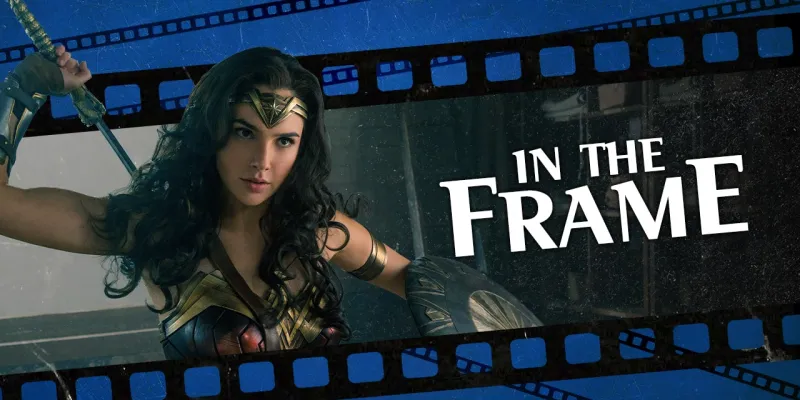Wonder Woman was released three years ago this weekend. After some initial scheduling shifts, Wonder Woman 1984 was planned to open this weekend. As such, it seems like the perfect opportunity to reflect on Patty Jenkins’ superhero origin story. It’s a rare modern superhero film that is actively engaged with the underlying themes and ideas of the genre: what it means to be a hero.
Formally and narratively, Jenkins builds Wonder Woman as a fairly conventional superhero blockbuster. The framing device of Diana (Gal Gadot) working at the Louvre and receiving a package from Wayne Enterprises provides the obligatory nod to the shared universe. An alleyway confrontation hearkens back to a key scene from Richard Donner’s Superman.
Even the structures and rhythms of the story are straightforward. Robin Wright plays Antiope, a mentor to Diana who dies early on as the plot gets moving. Chris Pine plays Steve Trevor, an outsider whose intrusion into Diana’s world serves as a call to adventure. There are clear character arcs, powerhouse set pieces, and a climactic act that is perhaps too saturated with CGI.
However, there’s something interesting happening underneath all of this, in terms of the journey that Diana takes. Before Steve came to the isolated island Themyscira, Diana lived a sheltered existence. She was taught that mankind is “fair and good, strong and passionate.” When she discovers that mankind is embroiled in the First World War, she sets out to stop it.
Diana is convinced that conflict on such a scale could only stem from the machinations of Ares, God of War. She concocts a simple plan to end the war. “And once I find and destroy Ares, the German armies will be freed from his influence and they will be good men again, and the world will be better.” It sounds too good to be true.

Various characters spend the movie trying to convince Diana that she is wrong. When she insists that mankind could not be responsible for such horrors, citing the tales that she grew up with, her mother Hippolyta (Connie Nielsen) warns, “That was a story, Diana.” Likewise, Steve describes the war as “a great big mess.” Supporting characters chide Diana for her naivety.
What’s most striking about Wonder Woman is the extent to which it agrees with the characters around Diana and allows Diana to be wrong. Diana is wrong to assume that Ares has disguised himself as German General Erich Ludendorff (Danny Huston), just as she is wrong to believe that killing Ares will free mankind from his manipulations and allow mankind to “be good men again.”
Superhero stories often hinge on the idea that people are fundamentally good. In Richard Donner’s Superman, Jor-El (Marlon Brando) argues that people “only lack the light to show the way.” In Sam Raimi’s Spider-Man and Spider-Man II, New Yorkers repeatedly rush to the defense of Spider-Man (Tobey Maguire) in his moments of vulnerability and desperation.
Christopher Nolan has occasionally been described as a “cold” or “dispassionate” director, but a warm humanism radiates from his Dark Knight trilogy. Ra’s Al Ghul (Liam Neeson) needs to use fear gas to tear Gotham apart. The Joker (Heath Ledger) cannot get two ferries to blow one another up. Bane (Tom Hardy) has to release armed criminals and use mercenaries to bring anarchy to Gotham. The city always claws its way back.
In contrast, Wonder Woman is decidedly more cynical about human nature. Wonder Woman argues that men are very rarely good. The choice to set Wonder Woman in the First World War rather than the Second World War helps, as the First World War does not hold the same position in American history as “the Good War.” If anything, the First World War is a catastrophic folly.

Diana quickly discovers that there are few heroes in real warfare. Field Marshal Douglas Haig (James Cosmo) argues against a mission to stop Ludendorff from using his chemical weapons. “If it is used, it will kill everyone on both sides,” Steve protests. “They will all die.” Haig callously responds, “That is what soldiers do, captain.” It’s a monstrous idea, and Diana is rightly horrified.
Wonder Woman forces Diana to confront the reality that mankind is responsible for this carnage, the horrors visited upon civilian populations. In fact, Wonder Woman ruthlessly demonstrates that Diana cannot necessarily stop it. The film’s big iconic set piece has Diana cross No Man’s Land to save the village of Veld, only for Ludendorff to wipe it out with his chemical weapons the following day.
Late in the movie, it is revealed that Ares has actually been posing as Sir Patrick Morgan (David Thewlis), a British politician pushing for peace. Inspecting the devastation, Ares insists, “Mankind did this, not me.” In contrast to Diana’s fantasy that men are good, Ares counters that they are “weak, cruel, selfish, and capable of the greatest horrors.”
This is a rather grim assessment for a superhero movie, but Wonder Woman commits to it. Diana acknowledges that Ares is correct in his understanding of mankind. This is an earth-shattering revelation for Diana, but it is the key to her arc. In the face of all this cynicism and desperation, Wonder Woman embraces romantic idealism.
Too many modern superhero films are tied up in the unchecked power fantasy of superheroism, in the uncritical idea that with great power comes the ability to do whatever a person wants. Very few modern superhero films engage with the idea of moral obligation or the importance of virtue. As the genre has become increasingly important in American cinema, it has stopped asking these questions.

Steve Rogers (Chris Evans) doesn’t reject the Sokovia Accords on point of principle in Civil War, but because they impact his best friend Bucky Barnes (Sebastian Stan). In Endgame, the Avengers’ plan to reverse “the snap” is not motivated by the loss of half of all life in the universe. They risk four separate timelines in order to restore their friends: Bucky Barnes, Peter Parker (Tom Holland).
In contrast, Wonder Woman argues that Diana has a moral obligation to use her power to make the world a better place, even if mankind doesn’t always deserve it and even if the outcome isn’t always what she would want. To (mis)quote a character from a rival comic book company, Diana comes to accept that with great power comes great responsibility.
“They don’t deserve our help,” Diana insists at the climax. In Wonder Woman, those fighting to save the world of men are those disenfranchised by it. Diana is a foreign woman. Sameer is played by Saïd Taghmaoui, a French-American actor of Moroccan descent. Chief Napi (Eugene Brave Rock) is a dispossessed member of the Blackfoot tribe, his home torn apart by the European settlers.
“It’s not about ‘deserve’!” responds Steve. “It’s about what you believe.” Diana, Steve, and Ares are all correct about the world of man. Wonder Woman grapples with a question percolating through contemporary pop culture in shows like The Good Place. At the same time that Wonder Woman was released, Steven Moffat’s final season of Doctor Who effectively broached the same question: what it means to be a good person in a world that is not.
This is a bold and meaningful argument about the superhero genre and pop culture in general, about the role that these sorts of stories have in times of uncertainty. At their best, superhero stories have never really been about unchecked power fantasies, but instead about the importance of using that power in a virtuous way, even when the world makes it difficult – or even impossible.
“What one does when faced with the truth is more difficult than you think,” Diana warns viewers in her opening monologue. Wonder Woman suggests a challenging and difficult answer about what a good person does when confronted with a world of horror and injustice: they act like a hero.

